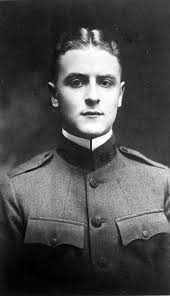Scott dropped out of university in 1917 and enlisted in the United States Army, receiving a commission as a Second Lieutenant.
While in training and waiting for deployment to the Western Front, Scott was stationed in a training camp at Fort Leavenworth in Kansas, under the command of Captain Dwight Eisenhower - future general of the Army and United States President. He didn’t like Eisenhower's authority and apparently disliked him intensely.
Hoping to have his work published, Scott wrote a 120,000-word manuscript entitled “The Romantic Egotist” completing it in three months. When he submitted the manuscript to Scribner's publishers however, they rejected it. The reviewer, Max Perkins, was impressed, praised his writing and encouraged Scott to resubmit it after revision.
In June 1918, Scott was garrisoned with the 45th and 67th Infantry Regiments at Camp Sheridan near Montgomery, Alabama. At a country club there, he met Zelda Sayre, a 17-year-old Southern belle and the grand-daughter of a wealthy Confederate senator, whose extended family owned the first White House of the Confederacy.
Before he wrote his first novel, Scott had hoped to publish a collection of his poems and may even have considered writing a novel in verse. For the rest of his life Scott wrote poetry, much of it humorous, which allowed him to indulge his love of rhyme.
After a long and industrious life, Scott died on 21st December 1940.
“WE LEAVE TO-NIGHT” by: F. Scott Fitzgerald (1896-1940)
We leave to-night . . .
Silent, we filled the still, deserted street,
A column of dim gray,
And ghosts rose startled at the muffled beat
Along the moonless way;
The shadowy shipyards echoed to the feet
That turned from night and day.
And so we linger on the windless decks,
See on the spectre shore
Shades of a thousand days, poor gray-ribbed wrecks . . .
Oh, shall we then deplore
Those futile years!
See how the sea is white!
The clouds have broken and the heavens burn
To hollow highways, paved with gravelled light
The churning of the waves about the stern
Rises to one voluminous nocturne,
… We leave to-night.
"We Leave To-night" is reprinted from “This Side of Paradise” F. Scott Fitzgerald (Scribners, New York,1920).
Sources: BBC television’s Mastermind, Wikipedia and
https://www.poetry-archive.com/f/fitzgerald_f_scott.html
https://www.thoughtco.com/f-scott-fitzgerald-biography-4706514
